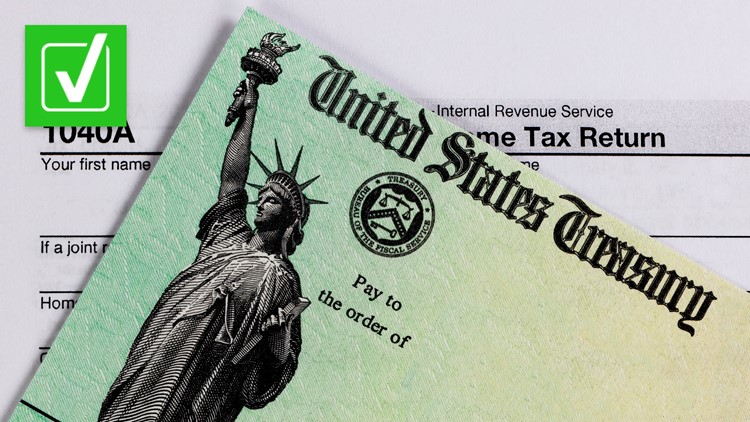The 2024 tax filing season began on January 29. While most people have until this year’s April 15 filing deadline to submit their taxes, and people who’ve filed for an extension even longer, plenty of people have already sent their returns to the IRS and are eagerly awaiting their refund.
Some VERIFY readers have already texted us to ask if it’s possible to track their tax return, and how to do so.
THE QUESTION
Is there a way to check the status of your tax refund?
THE SOURCES
THE ANSWER
Yes, there is a way to check the status of your tax refund.
WHAT WE FOUND
The Internal Revenue Service (IRS) has a web tool called “Where’s My Refund?” that people can use to track their tax refund. Alternatively, people can check the status of their refund through the IRS2Go mobile app.
People can use the tool and app to check the status of their 2023 income tax refund 24 hours after e-filing and four weeks after filing a paper return, the IRS says. People can also check the status of their tax refunds for 2021 and 2022, but the IRS says updates on those returns won’t appear until three or four days after filing.
Information on tax refund status is updated once a day, overnight.
To find your refund, you’ll need your Social Security or taxpayer ID number, your filing status and the exact refund amount on your return.
Once you do that, the IRS says the tracker will display progress through three stages:
- Return Received
- Refund Approved
- Refund Sent
USA.gov says refunds are generally issued within 21 days of e-filing a tax return but will take longer if you file a paper return. The IRS says paper returns could take four weeks or more.
There’s a good chance that you’ll find your tax refund is moving from stage to stage within those 21 days without issue. But you also might run into hiccups along the way. The IRS has different advice based on whether the return is lost before the IRS receives it, it’s stuck in processing or it's lost on the way back to you.
If you are due a refund, filed on paper more than six months ago and the tracker says the IRS never received it: You should resubmit your tax return, electronically, if possible. The IRS says you should only do this if all of those conditions are met because filing the same refund again could lead to further delays if they end up getting both.
If the return is stuck in processing: The IRS says a return in processing may be delayed because of a mistake, missing information or suspicion of identity theft or fraud. The IRS will fix it without contacting you if it can. If it needs more information, the IRS will send you a letter. Resolution of these issues could take more than 120 days depending on your response time and accuracy.
If the IRS sent your refund back, but you never received it: If it’s been more than 28 days from the date the IRS mailed your refund, you can file an online replacement for a replacement check. If this situation applies to you, the tracker on “Where’s My Refund?” and the IRS2Go app will give you detailed information about filing a claim.
These tools will still be the best way to check the status of your tax refund even if your refund is delayed past the tax filing deadline. You can read more about checking the status of a delayed refund here.
Beyond using the online tools, USA.gov says you can also call the IRS at 1-800-829-1040, although it warns that wait times to speak to a representative might be long. You can avoid the wait by using the automated phone system and following the message prompts when you call. The IRS Taxpayer Advocate Service says to wait at least 21 days after e-filing and at least six weeks after filing a paper return before calling the IRS.
Sometimes, individual tax filing services also have tools to check the status of your refund. For example, people who file with H&R Block can use the company’s website to track their refunds. You’ll need your last name, date of birth and Social Security number to check, and you’ll also have to use a dropdown menu to select how you filed with H&R Block.



